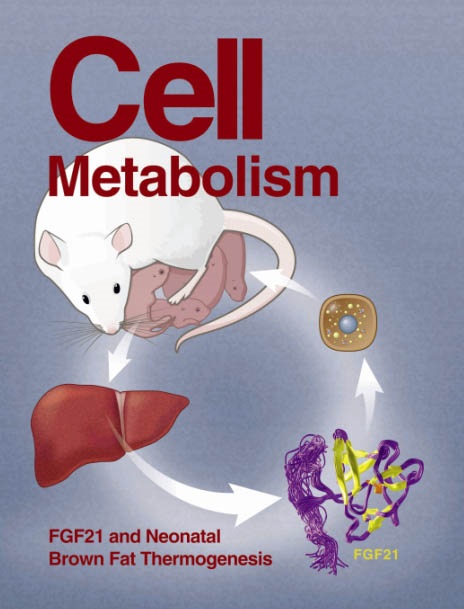替西帕肽不会影响肥胖人群的代谢适应,但会增加脂肪氧化
IF 30.9
1区 生物学
Q1 CELL BIOLOGY
引用次数: 0
摘要
Tirzepatide是一种葡萄糖依赖的胰岛素依赖性多肽和胰高血糖素样肽-1受体激动剂,在3期临床试验中促进了显著的体重减轻。我们进行了一项临床前研究和一项i期临床试验(NCT04081337),以了解替西肽诱导小鼠和肥胖患者体重减轻的潜在机制。在热量限制的肥胖小鼠中,用替西肽进行慢性治疗可以减少能量消耗的下降,这种情况发生在车辆治疗和成对喂养的小鼠中,表明替西肽减弱了代谢适应。替西肽治疗小鼠的呼吸交换率也下降,表明脂肪氧化增加。在临床试验中,替西帕肽似乎对代谢适应没有影响,但在随意试验餐期间导致脂肪氧化增加,食欲和卡路里摄入量减少(与安慰剂相比)。这是第一个从热量摄入、能量消耗和大量营养素利用方面深入了解替西肽对减肥作用机制的研究。本文章由计算机程序翻译,如有差异,请以英文原文为准。

Tirzepatide did not impact metabolic adaptation in people with obesity, but increased fat oxidation
Tirzepatide, a glucose-dependent insulinotropic polypeptide and glucagon-like peptide-1 receptor agonist, promoted significant body weight reduction in the phase 3 clinical trials. We conducted a preclinical study and a phase 1 clinical trial (NCT04081337) to understand potential mechanisms mediating tirzepatide-induced weight loss in mice and people with obesity. In calorie-restricted, obese mice, chronic treatment with tirzepatide reduced the drop in energy expenditure that occurred in vehicle-treated and pair-fed mice, indicating that tirzepatide attenuated metabolic adaptation. Respiratory exchange ratio also decreased in tirzepatide-treated mice, indicating increased fat oxidation. In the clinical trial, tirzepatide appeared to have no impact on metabolic adaptation but led to increased fat oxidation and reductions in appetite and calorie intake during an ad libitum test meal (vs. placebo). This is the first study to provide insights into the mechanisms of action of tirzepatide on weight loss with respect to calorie intake, energy expenditure, and macronutrient utilization.
求助全文
通过发布文献求助,成功后即可免费获取论文全文。
去求助
来源期刊

Cell metabolism
生物-内分泌学与代谢
CiteScore
48.60
自引率
1.40%
发文量
173
审稿时长
2.5 months
期刊介绍:
Cell Metabolism is a top research journal established in 2005 that focuses on publishing original and impactful papers in the field of metabolic research.It covers a wide range of topics including diabetes, obesity, cardiovascular biology, aging and stress responses, circadian biology, and many others.
Cell Metabolism aims to contribute to the advancement of metabolic research by providing a platform for the publication and dissemination of high-quality research and thought-provoking articles.
 求助内容:
求助内容: 应助结果提醒方式:
应助结果提醒方式:


